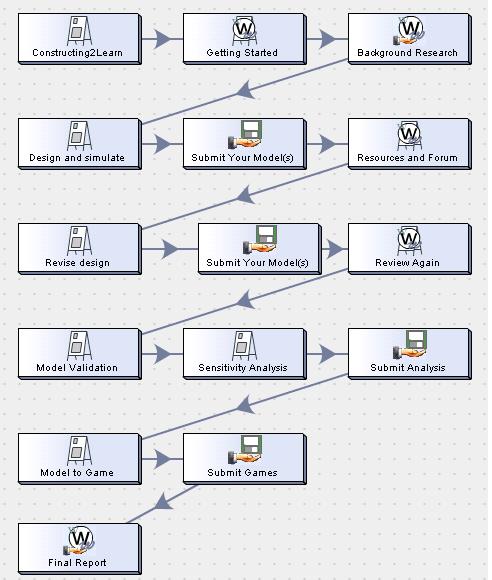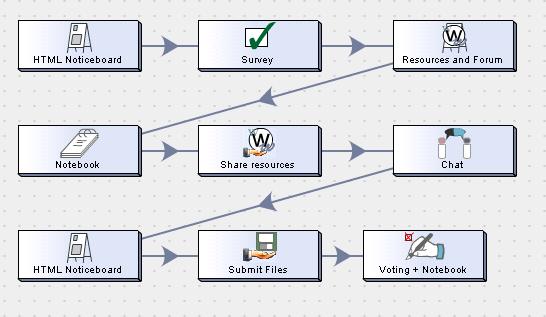Example Activity Sequences
Page Name = ExpExamples
The following example sequences, case studies, reports etc. illustrate the use of different activities and tools, as well as models of learning and learning outcomes. Some are embedded in Phoebe; others are stored in other online repositories or collections of resources.
Introduction to modelling
Sector: HE (postgraduate)
Subject area: Social science, although suitable also for zoology, economics and other complex systems.
Summary: This sequence introduces students to the principle of building computer models and games. It includes a strong collaborative element, as students are invited to share their ideas and the models they produce (even though they actually create their models individually).
The sequence illustrates:
- Activities: Modelling, Analysing information
- Tools and technologies: Modelling tools Currently links to activity
- Learning outcomes: Develop concepts
- Model(s) of learning: Constructivist Learning Models, Research-Based Learning, Collaborative Learning
The sequence in detail:
This is where we will get into problems of linking and representation! For now, here's a screenshot of the LAMS sequence to act as a placeholder.
Defining e-learning
Sector: HE (undergraduate)
Subject area: Education
Summary: In this sequence students explore their perceptions of e-learning, through a combination of internet research, collaboration and reflection.
The sequence illustrates:
- Activities: Collecting information, Analysing information, Reflecting
- Tools and technologies: Learning design systems
- Learning outcomes: Develop concepts
- Model(s) of learning: Constructivist Learning Models, Research-Based Learning, Collaborative Learning
The sequence in detail:
This is where we will get into problems of linking and representation! For now, here's a screenshot of the LAMS sequence to act as a placeholder.
Problem-based learning in law
Sector: HE (undergraduate)
Subject area: Law.
Summary: This example introduces law students to problem-based learning. It encourages them to collaborate in reasoning and problem-solving tasks.
The example illustrates:
- Activities: Problem solving, Discussing
- Tools and technologies: wikis
- Learning outcomes: Develop concepts
- Model(s) of learning: Problem-Based Learning
The example in detail:
Students work in small teams to research their answers to the tutor’s questions. e.g. “Post a para saying I’ve been looking into this aspect of the question and I’ve used this resource and this website, and from that I deduce that part of the answer is such-and-such, and then another student comes in and says well I’m not sure about that because I’ve found this Website which says something slightly different, and they edit their response collectively, which turns out to be more efficient than using a discussion, because you’re working directly on the text, the answer itself rather than a whole series of discussion postings.
Collaborative writing in English literature
Sector: FE
Subject area: English literature
Summary: The example is intended to as a revision aid by encouraging students to collect their ideas about the text, then organise and represent it.
The example illustrates:
- Activities: Writing
- Tools and technologies: wikis
- Learning outcomes: Acquire knowledge, Develop Conceptions
- Model(s) of learning: Constructivist Learning Models
The example in detail:
You can read about this example in a report. Link to paper describing it -- should be in the JISC Online Conference e-book.
Using a wiki to develop research skills
Sector: FE
Subject area: General research skills for online learning
Summary: The example is intended to help students on an access course reach a shared understanding about a particular topic and to improve their research skills.
The example illustrates:
- Activities: Manipulating and organising information, Synthesising information, concepts and ideas,Presenting information
- Tools and technologies: wikis
- Learning outcomes: Develop Conceptions
- Model(s) of learning: Constructivist Learning Models
The example in detail:
You can read about this example in a report. Link to paper describing it -- should be in the JISC Online Conference e-book.


